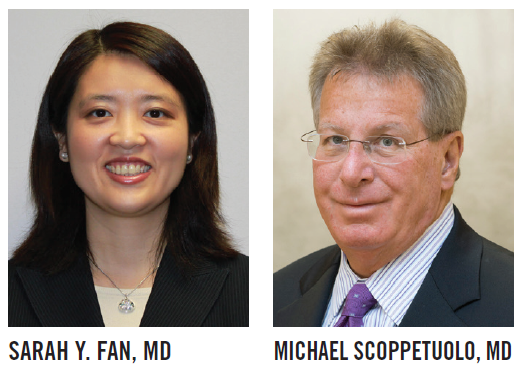Cardio-oncology specialists help cancer patients avoid heart problems.
What does heart disease have to do with cancer, and vice versa?
Over the past few years, researchers and physicians have determined that the answer is: quite a bit. As new cancer treatments become available, the relationship between heart disease and cancer takes new forms.
That has spawned a new type of medical focus called “cardio-oncology,” which is  found only at the most advanced medical centers. “This is a new and evolving field of care, where cardiologists and oncologists work together to understand what cancer treatments have an effect on the heart and which patients might be affected,” says Sarah Y. Fan, MD, a cardiologist at Saint Barnabas Medical Center (SBMC) and a member of RWJBarnabas Health Medical Group.
found only at the most advanced medical centers. “This is a new and evolving field of care, where cardiologists and oncologists work together to understand what cancer treatments have an effect on the heart and which patients might be affected,” says Sarah Y. Fan, MD, a cardiologist at Saint Barnabas Medical Center (SBMC) and a member of RWJBarnabas Health Medical Group.
“For decades, we’ve known that some cancer treatments can cause heart damage,” says Michael Scoppetuolo, MD, Chief Medical Officer of the Cancer Center at SBMC. “Previously, however, only a handful of drugs had that risk. Today, there are more effective treatments for cancer than ever before, but a significant and growing number of them can damage the heart.
“We also now know how to prevent heart damage and to correct these heart issues,” says Dr. Scoppetuolo, “so that our patients can get both the most effective cancer treatment as well as the most effective care for their heart.”
WHO’S AT RISK?
Some cancer treatments can lead to high blood pressure, abnormal heart rhythms and heart failure. These side effects may be caused or worsened by chemotherapy, radiation therapy or newer treatments such as targeted therapies and immunotherapies.
Patients most likely to be at risk are those treated for breast cancer. Less commonly, patients being treated for lymphoma can also be at risk. However, because some cancer treatments are so new and so personalized, cardio-oncology specialists can’t necessarily specify categories of patients and levels of risk. The type of cancer, type of treatment and the patient’s overall health are all important factors.
“Every drug and every person is different,” says Dr. Fan, who has a special interest in cardio-oncology as well as nuclear cardiology and echocardiology. “People who are older, who have a history of heart disease, who are overweight or obese, or who have diabetes or hypertension have a greater risk to their heart during some cancer treatments.”
Sometimes a cancer treatment’s effect on the heart is rapid. In other cases, the damage can occur five, 10 or even 15 years after a person has completed cancer treatment.
CLOSE MONITORING
The cardio-oncology team at SBMC works closely with Rutgers Cancer Institute of New Jersey, the state’s only NCI-Designated Comprehensive Cancer Center, to evaluate cases. The team takes many deliberate steps to ensure each patient’s health.
“We test everyone before cancer treatment to identify existing heart conditions and to evaluate any risk to the heart,” says Dr. Scoppetuolo. “Depending on these results, we can adjust the cancer treatment by changing the drug, or by making sure any heart conditions they have are well under control.”
If someone has high blood pressure or heart failure, for example, the team at SBMC provides targeted treatment for that condition before chemotherapy or radiation begins. During cancer treatment, the team monitors the patient carefully to see if changes to a heart medicine are required.
“In this way, we can catch some heart issues early and provide medicines to prevent or limit any further damage,” Dr. Fan says. “This close monitoring helps us make sure the cancer treatment works as well as possible, too.”
When cancer treatment ends, SBMC’s cardio-oncology specialists also make sure patients with higher risks have regular follow-up exams, sometimes every three months, and sometimes for years after.
To make an appointment with a cardio-oncology specialist at Saint Barnabas Medical Center, call 888.724.7123 or visit www.rwjbh.org/cardiooncology.